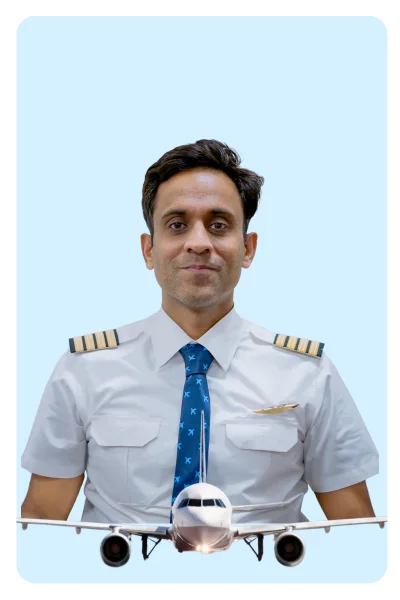Navigating Career Transitions in Aviation
When I switched airlines, I experienced quite a cultural shock, but trust me, it was a good thing! I had no idea that such a positive and vibrant culture could exist in India. I found myself loving it.
What's amazing is how the captains would share food with the crew, and everyone was so friendly and supportive. The safety culture was top-notch, and it felt like everyone genuinely cared for one another. It was great to see the cabin crew and pilots interacting, discussing not just work but also sharing bits of their personal lives.
Whenever the cabin crew felt something wasn't right, the captains were open to communication. This kind of teamwork is vital, and it reminded me of how important it is to embrace change. Those relationships and camaraderie make a huge difference in our work environment and help create a positive atmosphere. It’s truly inspiring to be part of a culture that prioritizes both safety and a sense of community!
Sometimes, we really don’t know what’s waiting for us in our next move, whether it’s a shift, a career change, or a new opportunity. It’s easy to feel hesitant or afraid of stepping into the unknown, but I truly believe we should give it a shot!
If we don’t try, we’ll never get to experience the potential benefits and exciting changes that could come our way. Every change has its own flavor—some may be sweet, while others are a bit spicy or even challenging. But each experience helps us grow and learn more about ourselves and the world around us.
So, let’s embrace the possibility of change! Trying something new might lead to opportunities and experiences that we never would have imagined. After all, the journey of growth often comes from stepping outside our comfort zones.
1. Embracing Change: The First Step to Growth
I believe many pilots might feel hesitant about making changes, whether it’s switching airlines, moving into management roles, or taking on additional responsibilities. However, I think it’s crucial to embrace these opportunities for growth!
At a young age, it’s the perfect time to explore new possibilities and take on challenges. Each change opens up chances for learning and development that can really propel your career forward. Rather than seeing these changes as daunting, we should view them as stepping stones to greater things.
Embracing challenges is key to personal and professional growth. It helps build resilience, enhances skills, and can lead to exciting new paths in your career. So let’s not shy away from change! Instead, let’s grab hold of those opportunities and see where they take us. The journey is worth it!
2. Reassess Your Why: Understanding Your Motivation
I knew I wanted to do more than just fly—I wanted to mentor and guide aspiring pilots. My deep-seated passion for teaching and empowering others became my driving force. Having clarity in your ‘why’ will help you stay committed even when the transition feels tough.
Sometimes, making decisions about taking on additional responsibilities or moving to the management side can feel overwhelming. It's important to weigh our options carefully. One great way to clarify your thoughts is to grab a pen and paper and list out the pros and cons of each option. By writing things down, you can visually see the advantages and disadvantages of taking on more responsibilities or shifting your focus.
Think about what excites you, what challenges you might face, and how these choices align with your career goals. Putting it all on paper can help you organize your thoughts and make a more informed decision. Taking the time to reflect in this way can lead to clearer insights and ultimately help you feel more confident in your choices. Embrace the process, and remember that every decision is an opportunity for growth!
3. Gaining the Necessary Skills: Bridging the Knowledge Gap
I think when your "why" is clear—whether it’s switching roles, taking on new responsibilities, moving to a different airline, or even changing industries—it makes a big difference in how you approach the decision. If you have a strong motivation behind your choice, it will drive you to put in the effort needed.
If it’s your passion and something you genuinely enjoy, you’ll naturally be inclined to pursue all the necessary training to acquire the skills you need. Passion fuels dedication, and when you really care about something, you’ll go above and beyond to make it happen.
So, remember that clarity and passion will guide you through the process. When those two elements are in place, you can tackle any training, overcome challenges, and ultimately achieve your goals. You’ve got this—just keep your vision focused on what you love!
4. Networking: The Power of Relationships in Aviation
This is a very important point! I've noticed that a lot of skilled and talented people sometimes don’t progress as quickly in their careers as those who have excellent personal relationship skills. It’s interesting to see that even if someone isn’t the most technically skilled, their ability to connect with others can really help them move up the ladder faster.
Building personal relationships and communication skills can open doors that you might not even expect. It helps create a network of support and trust, which is essential in any profession. I genuinely believe that if someone struggles in this area, they should invest time in developing these skills.
If you're looking to move into a management role, it's essential to start building meaningful relationships with management pilots and other leaders within your organization. Networking with them can provide you with valuable insights into their roles and responsibilities, opening doors for future opportunities.
On the other hand, if your interest lies in the safety side of aviation, consider enrolling in relevant courses that focus on safety management. Doing this not only enhances your knowledge but also allows you to connect with professionals in the safety department.
Building these relationships is key. They can provide guidance, mentorship, and support as you pursue your career goals. Whether you’re aiming for management or safety, intentional networking and education will help pave the way for your success. Remember, it’s all about creating connections and seizing opportunities that come your way!
5. Mental Resilience: Overcoming Fear & Doubt
This is one of my favorite areas to talk about! I often have pilots come to me expressing their frustrations, saying things like, “I haven’t achieved this,” or “I’m not getting the job I want.” I see that many pilots, even those with qualifications, struggle with this.
I believe this is a critical area where I can really help. I’ve realized that developing strong mental resilience is essential for anyone in aviation. It’s important to work on these skills because they can make a significant difference in how you navigate challenges and setbacks.
Building mental strength doesn’t come easy—it's something that requires time and effort. But I’m committed to developing this skill, not just for myself but to support other pilots too. Having a strong mindset is crucial because it helps you stay focused and determined, especially during tough times in your career. Remember, the journey can be filled with ups and downs, and cultivating resilience can help you succeed in aviation!
6. Financial & Logistical Planning: Be Practical
When considering a move to the Middle East or relocating from a smaller town to a metro city, it's essential to do thorough financial and logistical planning. You need to account for various factors, such as living expenses, cost of training, and potential job opportunities in your new location.
For instance, if you're moving to a place with a higher cost of living, you’ll want to budget accordingly. It’s also important to research the airlines operating in that region and understand the job market to ensure you’re making a worthwhile investment in your career.
Logistically, think about the practical aspects of relocating—housing, transportation, and even the cultural differences you might encounter. It’s vital to plan these details out ahead of time to make the transition smoother and less stressful.
Taking the time to create a solid plan can help you avoid surprises and ensure that your move supports your goals rather than hinders them. With the right planning, you'll be well-positioned to embark on this exciting new chapter in your aviation career!
7. Giving Back: The True Mark of a Leader in Aviation
Aviation is an industry built on mentorship and shared wisdom. Once you successfully navigate your transition, help others do the same.
Mentor aspiring pilots who are unsure about their next steps.
Share your journey—talk about your challenges, mistakes, and lessons learned.
Encourage a culture of support and growth within the aviation community.
I believe the real legacy of a pilot is not just the flights they take but the dreams they inspire in others. The greatest fulfillment in my career has come from seeing aspiring pilots achieve their dreams, knowing that I played a small role in guiding them.
Final Thoughts: Your Career is a Flight Path, Not a Fixed Destination
Aviation is a field of endless opportunities. You are not limited to just one role or one path. Every pilot, instructor, engineer, or aviation executive has the power to reinvent themselves and carve a new direction.
If you are considering a transition within aviation, believe in yourself, plan strategically, and take action. The sky is vast, and so are the possibilities.
Have you experienced a career transition in aviation? What challenges did you face, and what advice would you give others? Let’s support each other—share your journey in the comments below!

 (8).png)


 (6).png)
 (2).png)
 (13).png)
 (7).png)
.png)
 (11).png)
 (1).png)
.png)
 (12).png)
 (10).png)










